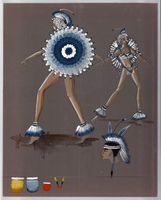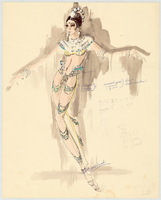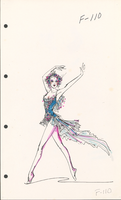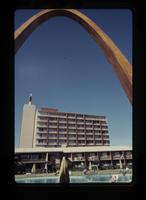Search the Special Collections and Archives Portal
Search Results

Costume design drawing, blue and white feathered Indian ensemble with headdress and cuffs, Las Vegas, 1968
Date
1968
Archival Collection
Description
Costume Details: American Indian-style costume with blue and white feathers, headdress, and shield.
Show Name: Pony Express
Site Name: Sahara Hotel and Casino
Show Name: Pony Express
Site Name: Sahara Hotel and Casino
Image

Costume design drawing, gold jeweled showgirl costume with headpiece and gold bands, circa 1965-75
Date
1965 to 1975
Archival Collection
Description
Costume Details: Female gold, turquoise, and white jeweled costume with gold arm and leg bands. Similar to Spinedi-16. Artist's notations: "4 small, 4 small, 1 large, 2 small gold, 1 pearl, 1 gold- Boy's lead nudes, gold band."
Image

Costume design drawing, gold digger showgirl costume, Las Vegas, June 5, 1980
Date
1980-06-05
Archival Collection
Description
Bob Mackie design. Transcribed from original drawing index: "16 Bluebells (Gold diggers)."
Costume Details: Showgirl wearing a costume made of yellow and gold faux coins, with brown fur muff and gold feathered headpiece.
Show Name: Jubilee!
Performance Name: Bandwagon finale: B-Babies
Site Name: MGM Grand Hotel and Casino
Costume Details: Showgirl wearing a costume made of yellow and gold faux coins, with brown fur muff and gold feathered headpiece.
Show Name: Jubilee!
Performance Name: Bandwagon finale: B-Babies
Site Name: MGM Grand Hotel and Casino
Image

Costume design drawing, sheer blue showgirl costume with fuchsia jewels, Las Vegas, 1981
Date
1981
Archival Collection
Description
Bob Mackie design. Transcribed from original drawing index: "16 Bluebells A&B (Celestial Nights, look #1)."
Costume Details: Sheer blue showgirl costume decorated with fuchsia jewels, jeweled bra, matching headdress and cuffs.
Show Name: Jubilee!
Performance Name: Bandwagon finale: Celestial nights
Site Name: MGM Grand Hotel and Casino
Costume Details: Sheer blue showgirl costume decorated with fuchsia jewels, jeweled bra, matching headdress and cuffs.
Show Name: Jubilee!
Performance Name: Bandwagon finale: Celestial nights
Site Name: MGM Grand Hotel and Casino
Image

Costume design drawing, teal and fuchsia ballerina costume, Las Vegas, 1981
Date
1981
Archival Collection
Description
Bob Mackie design. Transcribed from original drawing index: Principal girl dancer (Vienna, Ballerina)."
Costume Details: Teal costume decorated with fuchsia jewels, matching sheer train, matching headdress.
Show Name: Jubilee!
Performance Name: Bandwagon finale: Vienna
Site Name: MGM Grand Hotel and Casino
Costume Details: Teal costume decorated with fuchsia jewels, matching sheer train, matching headdress.
Show Name: Jubilee!
Performance Name: Bandwagon finale: Vienna
Site Name: MGM Grand Hotel and Casino
Image

Costume design drawing, topless showgirl in blue and black feathered ensemble, Las Vegas, 1981
Date
1981
Archival Collection
Description
Bob Mackie design. Transcribed from original drawing index: "Nude showgirl (Blue #1)."
Costume Details: Topless showgirl in jeweled blue and black sheath-style skirt topped in paisley design with long blue and black feathers, large matching headdress; fuchsia accents.
Show Name: Jubilee!
Performance Name: Bandwagon finale: Stairway
Site Name: MGM Grand Hotel and Casino
Costume Details: Topless showgirl in jeweled blue and black sheath-style skirt topped in paisley design with long blue and black feathers, large matching headdress; fuchsia accents.
Show Name: Jubilee!
Performance Name: Bandwagon finale: Stairway
Site Name: MGM Grand Hotel and Casino
Image

Costume design drawing, topless showgirl in red and black feathered ensemble, Las Vegas, 1981
Date
1981
Archival Collection
Description
Bob Mackie design. Transcribed from original drawing index: "nude showgirl (red #1)."
Costume Details: Topless showgirl in red and black jewelled sheath-style costume, with large headdress of red feathers tipped with black; matching bracelets and earrings.
Show Name: Jubilee!
Performance Name: Bandwagon finale: Stairway
Site Name: MGM Grand Hotel and Casino
Costume Details: Topless showgirl in red and black jewelled sheath-style costume, with large headdress of red feathers tipped with black; matching bracelets and earrings.
Show Name: Jubilee!
Performance Name: Bandwagon finale: Stairway
Site Name: MGM Grand Hotel and Casino
Image

Film transparency of Desert Inn swimming pool and tower, framed by arch, Las Vegas, circa 1967-1972
Date
1967 to 1972
Archival Collection
Description
A view of the Desert Inn swimming pool and tower, with an arch in the foreground.
Image

Aerial photo of Crescent Dunes Solar, near Tonopah, Nevada: digital photograph
Date
2015-10-09
Archival Collection
Description
Photographer's note: "Aerial photograph of Crescent Dunes Solar, a 110MW tower style concentrated solar power plant with molten salt storage near Tonopah, Nevada, USA."
Photographer's assigned keywords: "110 megawatts; CSP; Concentrated Solar Energy; Concentrated Solar Power; Crescent Dunes; NV; Nevada; Solar Reserve; SolarReserve; Tonopah; aerial; concentrated solar thermal; green energy; molten salt; renewable energy; storage; tower."
Photographer's assigned keywords: "110 megawatts; CSP; Concentrated Solar Energy; Concentrated Solar Power; Crescent Dunes; NV; Nevada; Solar Reserve; SolarReserve; Tonopah; aerial; concentrated solar thermal; green energy; molten salt; renewable energy; storage; tower."
Image

Heliostats at Crescent Dunes Solar, near Tonopah, Nevada: digital photograph
Date
2015-10-09
Archival Collection
Description
Photographer's note: "Heliostats at Crescent Dunes Solar, a 110MW tower-style concentrated solar power plant with molten salt storage, near Tonopah, Nevada, USA."
Photographer's assigned keywords: "110 megawatts; CSP; Concentrated Solar Energy; Concentrated Solar Power; Crescent Dunes; NV; Nevada; Solar Reserve; SolarReserve; Tonopah; aerial; concentrated solar thermal; green energy; heliostats; mirrors; molten salt; renewable energy; storage."
Photographer's assigned keywords: "110 megawatts; CSP; Concentrated Solar Energy; Concentrated Solar Power; Crescent Dunes; NV; Nevada; Solar Reserve; SolarReserve; Tonopah; aerial; concentrated solar thermal; green energy; heliostats; mirrors; molten salt; renewable energy; storage."
Image
Pagination
Refine my results
Content Type
Creator or Contributor
Subject
Archival Collection
Digital Project
Resource Type
Year
Material Type
Place
Language
Records Classification
